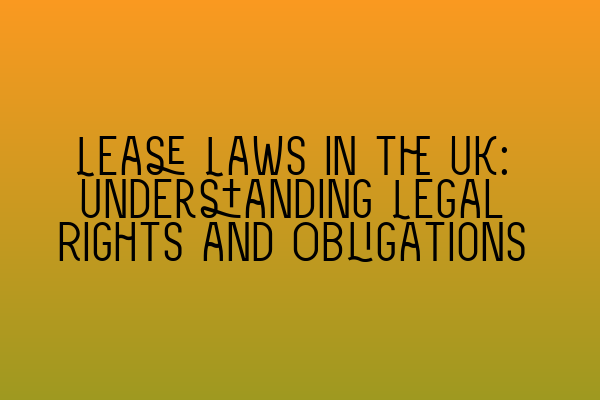Lease Laws in the UK: Understanding Legal Rights and Obligations
As the property market continues to thrive in the UK, it becomes increasingly important for property owners, tenants, and investors to have a solid understanding of lease laws. Whether you are a landlord renting out a property or a tenant looking to lease a space, having a grasp of lease laws and your legal rights and obligations is crucial to protect your interests. In this blog post, we will delve into the basics of lease laws in the UK, providing you with the information you need to navigate the leasing process with confidence.
I. What is a Lease Agreement?
A lease agreement, also known as a tenancy agreement, is a legally binding contract between a landlord (the property owner) and a tenant (the individual or business renting the property). The lease agreement outlines the terms and conditions of the tenancy, including the duration, rent amount, responsibilities of both parties, and any other provisions specific to the lease arrangement. By signing a lease agreement, both the landlord and tenant agree to abide by the terms and conditions set forth in the contract.
II. Types of Lease Agreements
Lease agreements in the UK can fall into various categories, including:
1. Assured Shorthold Tenancies (ASTs):
ASTs are the most common type of tenancy agreement in the UK and are typically used for residential properties. These tenancies provide tenants with a minimum of 6 months’ security, during which the landlord cannot evict them unless specific legal grounds are met.
2. Commercial Leases:
Commercial leases are used for properties intended for commercial use, such as offices, retail spaces, and industrial units. These leases can vary widely in their terms and conditions and are often negotiated between the landlord and tenant with the assistance of professional advisors.
3. Ground Leases:
Ground leases are typically long-term leases that involve renting only the land, with the tenant responsible for constructing and maintaining any buildings or structures on the land. These leases are common for large commercial developments and are usually subject to detailed provisions regarding the development and use of the land.
III. Legal Rights and Obligations of the Parties
1. Landlord’s Obligations:
Landlords have certain legal obligations towards their tenants, including:
– Providing a safe and habitable property.
– Carrying out necessary repairs and maintenance.
– Protecting the tenant’s deposit in a government-approved scheme.
– Following proper procedures when evicting a tenant.
2. Tenant’s Obligations:
Tenants also have obligations outlined in the lease agreement, such as:
– Paying rent on time.
– Taking proper care of the property.
– Reporting any maintenance issues promptly.
– Adhering to any restrictions or rules specified in the lease.
IV. Termination of a Lease
Lease termination can occur through various means, including:
1. Expiry of the Term:
When a lease’s term expires, the tenancy ends automatically, and unless a new agreement is reached, the tenant must vacate the property.
2. Notice to Quit:
Either party can terminate a tenancy by giving notice to quit, which must comply with the required notice periods specified by law or the lease agreement.
3. Breach of the Lease:
If either party breaches the terms of the lease agreement, the other party may be entitled to terminate the lease, subject to legal remedies and potential compensation.
It is important to note that lease laws can be complex and may vary depending on the type of tenancy, location, and additional factors. Consulting with a qualified property lawyer is essential to ensure that you fully understand your rights and obligations under your specific lease agreement.
V. How to Protect Your Interests
To protect your interests and ensure a smooth leasing process, consider the following tips:
1. Seek Professional Advice:
Engage the services of a property lawyer who specializes in lease laws. They can review the lease agreement, negotiate on your behalf, and provide invaluable guidance throughout the process.
2. Conduct Due Diligence:
Before entering into a lease agreement, thoroughly inspect the property, review the terms and conditions, and clarify any uncertainties. Understanding the lease agreement is vital to avoid future disputes.
3. Regularly Communicate:
Maintain open and honest communication with the other party. Promptly address any issues or concerns that arise during the tenancy to prevent them from escalating into larger problems.
In conclusion, lease laws in the UK play a vital role in protecting the rights and obligations of landlords and tenants. Having a comprehensive understanding of lease agreements and the legal framework surrounding them is essential for anyone involved in the property market. By seeking professional advice, conducting due diligence, and maintaining communication, you can navigate the leasing process with confidence.
For more information on lease laws, related legal topics, and exam preparation resources, please check out the following articles:
– [SQE 1 Practice Exam Questions](https://fqps.co.uk/sqe/sqe1-preparation/mcq-practice-quiz)
– [SQE 1 Practice Mocks FLK1 FLK2](https://fqps.co.uk/sqe/sqe1-preparation/practice-mocks-quiz)
– [SQE 2 Preparation Courses](https://fqps.co.uk/sqe/sqe2-preparation)
– [SQE 1 Preparation Courses](https://fqps.co.uk/sqe/sqe1-preparation)
– [SRA SQE Exam Dates](https://fqps.co.uk/sqe/sqe1-sqe2-exam-dates)
Remember, it is always best to consult a qualified legal professional for advice tailored to your specific circumstances.
